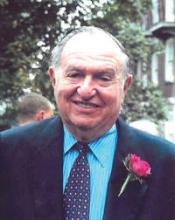For the first two-thirds of the 20th century, Sigmund Freud and Adolph Meyer were the most influential figures in American psychiatry. Then Mel Sabshin picked up the mantle and became the person most responsible for shaping psychiatry into its current form.
Mel’s recent death is a sad milestone. Beyond the personal loss of an endearing and much beloved man, it casts into sharp relief how much our field misses his long vision, wise counsel, and extraordinary leadership.
Mel was appointed medical director of the American Psychiatric Association in 1974. He inherited a mess. Psychiatry was in a confused funk – torn by internal dissension, widely attacked from without, and rapidly becoming irrelevant to the rest of medicine. The smart money would have bet against us.
But Mel turned it around. With brilliant (but always unobtrusive) diplomacy and leadership, he was able to integrate the warring elements within the association, pacify the critics from without, and help our profession regain both medical credibility and scientific distinction.
Mel believed that psychiatry should be a large and open tent – strengthened by the integration of its disparate, but always complementary, viewpoints. His energetic promotion of the biopsychosocial model soon brought together psychiatrists who previously were divided into the mutually antagonistic psychodynamic, behavioral, community, family, and biological camps.
Mel also ensured that psychiatry would remain a member in good standing in the medical community. He did everything possible to advance the accuracy of its diagnoses, the efficacy of its treatments, and the strength of its foundation in basic and clinical science. He felt that it was essential that we develop a strong base of knowledge on the epidemiology of psychopathology (and normality), without which our diagnostic system could not achieve credibility. Benefiting from his effective advocacy, psychiatric research funding grew exponentially, so that now, across all medical schools, it is the No. 2 department in terms of National Institutes of Health research funding.
From without, psychiatry was variously attacked for being unscientific, ineffective, stigmatizing, and acting as a tool of the state. Mel soothed the troubled waters by always treating opponents with respect and understanding – often finding unexpected common ground whenever this was possible and being unfailingly cordial when he had to pursue a different agenda. His remarkable diplomatic skills were applied, almost always behind the scenes, across an astounding range of national, international, and professional stages – from Soviet misuse of psychiatry to revolutionizing psychiatric diagnosis to ensuring that effective leaders were successfully recruited and placed in major policy and academic positions.
Mel could accomplish so much because he had an almost unique combination of two traits that rarely sort together – he was usually simultaneously both the smartest and yet also the humblest person in the room. Mel was always playing three-dimensional chess while the rest of us were playing Chinese checkers.
He spoke little, softly, and patiently, but with such surpassing wisdom and extraordinary judgment that others routinely followed his lead and sought his sage suggestions. Add to this that Mel was totally comfortable in his own skin, made others more comfortable in theirs, and had zero need to show off or take credit. Mel was the right man doing the right job in the right place and at the right time – someone who shaped history and made a difference. He left a gaping hole in the American Psychiatric Association that can never be filled.
On a personal level, Mel was always good humored, unfailingly avuncular, hilariously funny, and a joy to be with. He heavily sprinkled serious work with a touch of mischief and a delightful irreverence for cant and pretension. Delighting in his front-row seat at the theater of human comedy, Mel had a keen eye for all of fate’s little ironies. And no one ever smoked a cigar better, with the possible exceptions of Sigmund Freud and Groucho Marx.
So long, Mel. You lived richly, accomplished much, and touched all our lives. You were a man in full, a man for all seasons.
Dr. Allen J. Frances served as chair and Dr. Harold A. Pincus as vice chair of the DSM-IV Task Force. Dr. Sabshin was the intellectual, spiritual, and practical driving force animating all of the steps that led to the DSM-IV.


